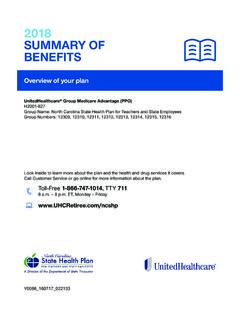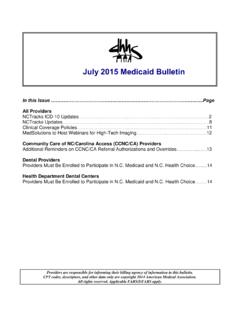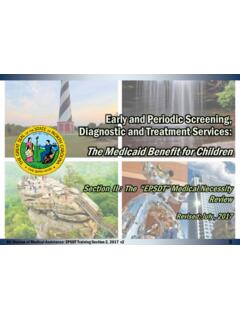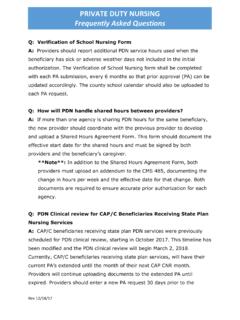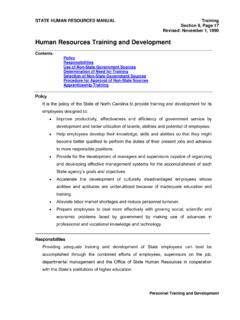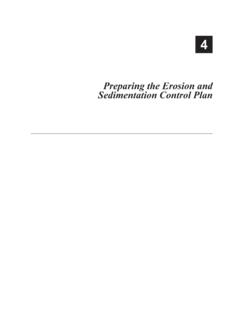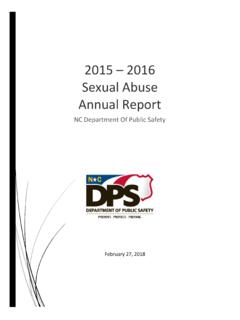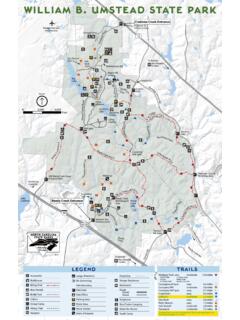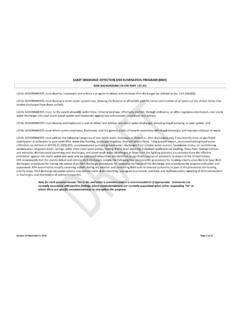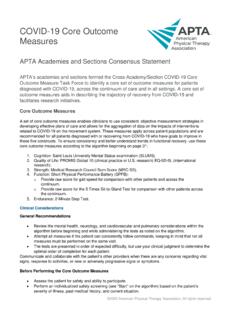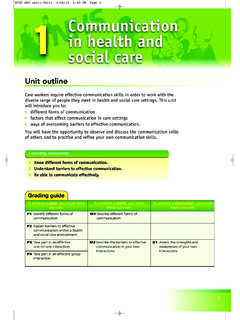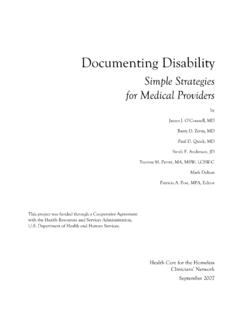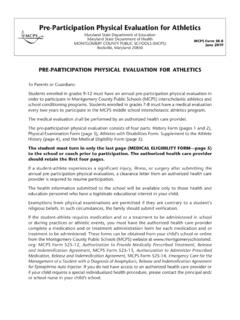Transcription of CLIENT RIGHTS RULES IN COMMUNITY MENTAL HEALTH ...
1 State of North Carolina APSM 95-2. Department of HEALTH and Human Services 7-1-2003. Division of MENTAL HEALTH , Developmental Disabilities and Substance Abuse Services CLIENT RIGHTS RULES . IN COMMUNITY . MENTAL HEALTH , DEVELOPMENTAL. DISABILITIES AND SUBSTANCE ABUSE. SERVICES. 10A NORTH CAROLINA ADMINISTRATIVE CODE 27C, 27D, 27E, 27F. Available free on the internet at: Printed version available for a fee of $ Make check out to Division of MENTAL HEALTH and send to: DMH Communications & Training Section 3022 Mail Service Center Raleigh, NC 27699-3022. EFFECTIVE: July 1, 2003. SUPERSEDES: APSM 95-2 (10/1/2001). The NC Department of HEALTH and Human Services does not discriminate on the basis of race, color, national origin, sex, religion, age or disability in employment or provision of services.
2 T10A 27C .0100. SUBCHAPTER 27C PROCEDURES AND GENERAL INFORMATION. SECTION .0100 GENERAL POLICIES AND PROCEDURES. 10A NCAC 27C .0101 SCOPE. (a) These RULES , 10A NCAC 27C, 27D, 27E and 27F, set forth procedures governing the protection of CLIENT RIGHTS in each public or private facility that provides MENTAL HEALTH , developmental disabilities and substance abuse services, with the exception of a state-operated facility. In addition to these RULES , the governing body shall comply with the provisions of 122C, Article 3, regarding CLIENT RIGHTS . (b) A facility that is certified by the Centers for Medicare and Medicaid Services (CMS) as an Intermediate Care Facility for the Mentally Retarded (ICF/MR), or a Medicare/Medicaid Hospital or a Psychiatric Residential Treatment Facility (PRTF) is deemed to be in compliance with the RULES in Subchapters 27C, 27D, 27E and 27F, with the exception of RULES 27C.
3 0102; 27D .0101; .0303; 27E .0104; .0105; .0108 and .0109. (c) A facility that is certified as specified in Paragraph (b) of this Rule shall comply with the following: (1) use of the definition of physical restraint as specified in Rule .0102 Subparagraph (b)(19) of this Section;. (2) documentation requirements as specified in 10A NCAC 27D .0303 and 10A NCAC 27E .0104; .0105;..0108 and .0109;. (3) debriefing requirements as specified in 10A NCAC 27D .0101 and 10A NCAC 27E .0104; and (4) training requirements as specified in 10A NCAC 27E .0108 and .0109. History Note: Authority 122C-51; 131E-67; 143B-17; 143B-147;. Eff. February 1, 1991;. Amended Eff. January 1, 1992;. Temporary Amendment Eff. January 1, 2001.
4 Temporary Amendment Expired October 13, 2001;. Amended Eff. April 1, 2003. 10A NCAC 27C .0102 DEFINITIONS. (a) The definitions contained in this Rule, and the terms defined in 122C-3, 122C-4 and 122C-53(f) also apply to all RULES in Subchapters 27C, 27D, 27E and 27F. (b) As used in these RULES , the following terms have the meanings specified: (1) "Abuse" means the infliction of MENTAL or physical pain or injury by other than accidental means, or unreasonable confinement, or the deprivation by an employee of services which are necessary to the MENTAL or physical HEALTH of the CLIENT . Temporary discomfort that is part of an approved and documented treatment plan or use of a documented emergency procedure shall not be considered abuse.
5 (2) "Anti-psychotic medication" means the category of psychotropic drugs which is used to treat schizophrenia and related disorders. Examples of neuroleptic medications are Chlorpromazine, Thioridazine and Haloperidol. (3) "Basic necessity" means an essential item or substance needed to support life and HEALTH which includes, but is not limited to, a nutritionally sound balanced diet consisting of three meals per day, access to water and bathroom facilities at frequent intervals, seasonable clothing, medications prescribed by a physician, time for sleeping and frequent access to social contacts. (4) " CLIENT advocate" means the term as defined in 122C-3. For the purpose of these RULES , a CLIENT advocate may be a facility employee who is not directly involved in the treatment/habilitation of a specific CLIENT , but who is assigned, in addition to other duties, to act as an advocate for that CLIENT .
6 (5) "Consent" means acceptance or agreement by a CLIENT or legally responsible person following receipt of information from the qualified professional who will administer the proposed treatment or procedure. Consent implies that the CLIENT or legally responsible person was provided with sufficient information, in a manner that the CLIENT or legally responsible person can understand, concerning proposed treatment, including both benefits and risks, in order to make a decision with regard to such treatment. (6) "Day/night facility" means a facility wherein a service is provided on a regular basis, in a structured environment, and is offered to the same individual for a period of three or more hours within a 24-hour period.
7 (7) "Director of Clinical Services" means Medical Director, Director of Medical Services, or other qualified professional designated by the governing body as the Director of Clinical Services. North Carolina Administrative Code 1. T10A 27C .0100. (8) "Emergency" means a situation in which a CLIENT is in imminent danger of causing abuse or injury to self or others or when substantial property damage is occurring as a result of unexpected and severe forms of inappropriate behavior and rapid intervention by the staff is needed. (9) "Exploitation" means the use of a CLIENT 's person or property for another's profit or advantage or breech of a fiduciary relationship through improper use of a CLIENT 's person or property including situations where an individual obtains money, property or services from a CLIENT from undue influence, harrassment, deception or fraud.
8 (10) "Facility" means the term as defined in 122C-3. For the purpose of these RULES , when more than one type of service is provided by the facility, each service shall be specifically addressed by required policy and procedures when applicable. (11) "Governing body" means, in the case of a corporation, the board of directors; in the case of an area authority, the area board; and in all other cases, the owner of the facility. (12) "Governor's Advocacy Council for Persons with Disabilities (GACPD)" means the council legislatively mandated to provide protection and advocacy systems and promote employment for all persons with disabilities in North Carolina. (13) "Intervention Advisory Committee" means a group established by the governing body in a facility that utilizes restrictive interventions as specified in Rule.
9 0104 of Subchapter 27E. (14) "Involuntary CLIENT " means an individual who is admitted to a facility in accordance with 122C, Article 5, Parts 6 through 12. (15) "Isolation time-out" means the removal of a CLIENT for a period of 30 minutes or more to a separate room from which exit is barred by staff, but not locked, and where there is continuous supervision by staff, for the purpose of modifying behavior. (16) "Minor CLIENT " means a person under 18 years of age who has neither been married nor been emancipated by a decree issued by a court of competent jurisdiction. (17) "Neglect" means the failure to provide care or services necessary to maintain the MENTAL or physical HEALTH and well-being of the CLIENT .
10 (18) "Normalization" means the utilization of culturally valued resources to establish or maintain personal behaviors, experiences and characteristics that are culturally normative or valued. (19) "Physical Restraint" means the application or use of any manual method of restraint that restricts freedom of movement; or the application or use of any physical or mechanical device that restricts freedom of movement or normal access to one's body, including material or equipment attached or adjacent to the CLIENT 's body that he or she cannot easily remove. Holding a CLIENT in a therapeutic hold or other manner that restricts his or her movement constitutes manual restraint for that CLIENT . Mechanical devices may restrain a CLIENT to a bed or chair, or may be used as ambulatory restraints.
